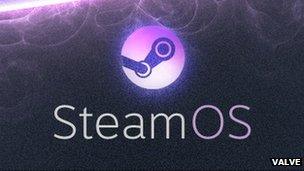Valve announces SteamOS as it renews living room push
- Published

SteamOS will be available as a free download "soon", Valve said in a message on its website
Video games developer and publisher Valve has announced SteamOS, a free operating system it hopes will help bring PC gaming into the living room.
The code will be made freely available for manufacturers who want to launch their own gaming hardware.
The announcement is the first of three due this week as Valve lays out what it calls the "future" of gaming.
The company is widely anticipated to launch its own machine to run SteamOS, believed to be called the Steam Box.
The console could potentially disrupt a market currently dominated by the Sony PlayStation, Microsoft Xbox and Nintendo Wii.
Ahead of a hardware reveal, Valve outlined its plans for the Linux-based operating system that will be available for download "soon".
"As we've been working on bringing Steam to the living room, we've come to the conclusion that the environment best suited to delivering value to customers is an operating system built around Steam itself," a message on Steam's website read, external.
"SteamOS combines the rock-solid architecture of Linux with a gaming experience built for the big screen."
Linux is a open-source operating system - meaning people can freely build-upon and adapt its source code.
Crucially, there are no licensing costs involved, so manufacturers can distribute Linux-powered machines more cheaply than those running systems such as Windows.
SteamOS will encompass Steam's already huge customer base, estimated to be about 50 million active users.
'Connect the dots'
Steam is Valve's distribution service through which it sells both its own games and those of its various publishing partners.
It began life in 2002 as a way for Valve to make it easier for users to update games, but it now is a significant channel for selling titles - and is also used as a community tool for setting up multiplayer matches and other online events.

Some have, perhaps optimistically, predicted an announcement this week about top game Half-Life
Valve does not release sales statistics for games sold through Steam - but estimates from consultancy IHS Screen Digest suggest it is responsible for 75% of PC game sales, bringing in about $1bn (£620m) in 2012.
There are more than 2,000 games on the service.
However, despite the service's popularity, it is currently reliant on something of a sinking ship, argued Computer and Video Games' associate editor Rob Crossley.
"Valve is a very successful growing company within a market that is shrinking," he told the BBC.
"PC sales are falling, falling, falling. They've been falling for five quarters in a row now.
"Valve knows that in order to expand in the future it needs to provide the same amount of services on different devices, and the living room is easily the best next step for them."
Shrinking market
To this end, Valve has long sought to take Steam-powered gaming away from the PC.
In 2011, the company launched Big Picture mode, an interface designed for a games controller rather than the typical PC's keyboard and mouse, making it more suitable for use with TV screens.
The Steam Box, should it be announced later this week, is expected to enhance that effort further, possibly doing away with the traditional PC entirely.
Gabe Newell, Valve's co-founder, made his strategic intentions clear during a speech at a Linux developer's event last week.
He envisioned an environment where gaming moves with the user, whether they are playing at their PC, in their living room or on the move.
Gabe Newell: "The main thing that's holding us up...we have a couple of different controllers prototypes we're using"
"Right now, you're sort of in this bizarre situation where as soon as you sit on your couch, you're supposed to have lost connection with all of your other computing platforms," he told delegates.
"We really don't think the fragmentation around the physical location or around the input devices in terms of computation is necessary or desirable for software developers or consumers."
Piers Harding-Rolls, from IHS Screen Digest, said he believed this kind of gaming would be popular in the future - but that the Steam Box could be somewhat ahead of its time, and Valve's greenness in the living room market could see it trip up.
"Valve has little experience in commercialising consumer hardware - it's inevitable that it will make mistakes along the way," he told the BBC.
"While Valve has experimented with bringing games to a more TV-friendly user interface with its Big Picture mode, many PC games will not translate effectively to console controllers so this remains a challenge to overcome."
But he added that the concept behind Steam Box could could be a "highly disruptive" force in the future.
Follow Dave Lee on Twitter @DaveLeeBBC, external
- Published17 September 2013
- Published12 September 2013
- Published10 June 2013
- Published15 May 2013